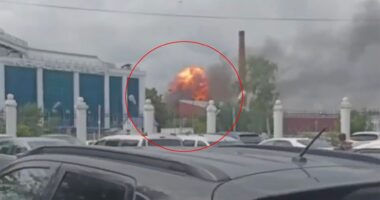
The Steel Industry (Special Measures) Bill has cleared the House of Lords and will become law once it receives royal assent.
Proposals to save British Steel’s Scunthorpe blast furnaces have been approved by Parliament after an extraordinary sitting on Saturday.
Emergency legislation granting the Government authority to direct British Steel to continue operations at the plant was swiftly approved by both the House of Commons and the House of Lords without opposition in just one day.
The Government’s decision to summon Parliament back from its Easter recess for a Saturday session was a remarkable move, made necessary as talks with British Steel’s Chinese proprietors, Jingye, reached an impasse.
Commons Speaker Sir Lindsay Hoyle has said: ‘It means the legislation has cleared the Houses of Parliament and become law.’
Jonathan Reynolds, the Business Secretary, publicly criticized the company, alleging a lack of good faith in their negotiating stance, particularly noting their cessation of raw material procurement essential for sustaining the blast furnaces in Scunthorpe.
He told MPs: ‘We could not, will not and never will stand idly by while heat seeps from the UK’s remaining blast furnaces without any planning, any due process or any respect for the consequences.
‘And that is why I needed colleagues here today.’
But the Conservatives said the Government should have acted sooner, with shadow leader of the House Alex Burghart accusing ministers of making ‘a total pig’s breakfast of this whole arrangement’.
Shadow business secretary Andrew Griffith said the Government was seeking a ‘blank cheque’, while Tory leader Kemi Badenoch claimed Labour had ‘botched’ a deal she had negotiated with British Steel while business secretary.
But she was unable to provide details of the deal, saying negotiations were still ongoing when last year’s election was called, but adding it ‘would have succeeded better’ than Mr Reynolds’s plan.
Opening Saturday’s debate, Mr Reynolds said Labour had been engaged in negotiations with Jingye since the party came to power last July, and had offered ‘substantial’ support.
Most recently, the Government had offered to purchase the necessary raw materials for the blast furnaces, the last primary steel-making facilities in the UK, but this had been met with a counter offer from Jingye demanding ‘an excessive amount’ of support.
Mr Reynolds continued: ‘Over the last few days, it became clear that the intention of Jingye was to refuse to purchase sufficient raw material to keep the blast furnaces running – in fact, their intention was to cancel and refuse to pay for existing orders.
‘The company would therefore have irrevocably and unilaterally closed down primary steelmaking at British Steel.’
While MPs debated the legislation, The Times reported that workers at the Scunthorpe plant had prevented Chinese executives from Jingye from gaining access to key areas of the steelworks.
Mr Reynolds said the emergency legislation was a ‘proportionate and necessary step’, adding he wanted it to be a ‘temporary position’ with the powers not lasting ‘any minute longer than is necessary’.
Meanwhile, Sir Keir Starmer met with steelworkers near Scunthorpe to discuss his Government’s plans for the plant.
The Prime Minister told them: ‘You are the people who have kept this going. You and your colleagues for years have been the backbone of British Steel, and it’s really important that we recognise that.’
Saturday’s emergency legislation stops short of full nationalisation of British Steel, and ministers remain hopeful that they can secure private investment to save the plant.
But there is currently no private company willing to invest in British Steel, and the Business Secretary acknowledged to the Commons that public ownership remained the ‘likely option’.
During Saturday’s debate, Reform UK’s deputy leader Richard Tice urged the Government to ‘show your cojones’ and go further by fully nationalising British Steel ‘this weekend’.
Several Conservative MPs also spoke in favour of nationalisation, while Liberal Democrat Treasury spokeswoman Daisy Cooper said recalling Parliament had been ‘absolutely the right thing to do’.
Meanwhile, the Government has been criticised for acting to save the Scunthorpe plant but not taking the same action when the Tata Steel works in Port Talbot were threatened with closure.
Liberal Democrat Wales spokesman David Chadwick said workers in South Wales ‘will be asking themselves how this unjust situation was ever allowed to occur’.
And Chinese bosses reportedly tried to enter key areas of British Steel’s Scunthorpe plant only hours before the crunch debate that could bring the furnace under government control.
Police were called to the scene and forced bosses of British Steel owners Jingye to leave after they were prevented from accessing core areas of the plant.
Humberside Police said: ‘Officers were in attendance at British Steel in Scunthorpe at 8.30am this morning following a suspected breach of the peace.
‘Upon attending, conducting checks and speaking to individuals in the area, there were no concerns raised and no arrests were made.’
Elsewhere in Scunthorpe, fans of the local football club as well as residents took to the streets in support of the steel workers as they all marched towards their local sporting ground.
In his visit, the Prime Minister also told the steelworkers: ‘I felt it was really important today, having been in Parliament this morning, to come straight up here to see you face to face to have that discussion with you.’
Former miner and local, Geoff Walton, 78, backed nationalisation plans, adding that it was a ‘good thing’.
‘I worked in the pit, if it goes [the steel works] this place is dead. I think they would shut it [the Chinese firm] so he’s had to buy it,’ he told the Telegraph.
‘It means a lot for an area like Scunthorpe. If they don’t work there, someone in their family does.’
Conservative MP for Chingford and Woodford Green, Sir Iain Duncan Smith, also hit out at the Chinese bosses, saying they had been ‘pushing forward to shut down the blast furnaces in the UK.
Speaking to the Commons, he said ‘far too many countries like China have abused the rules of the free market… and have used slave labour to produce products. When that happens, the free market is dead.’
He said it was not a surprise Jingye had been pushing for Scunthorpe’s closure due to China suffering ‘from an overproduction of steel, adding: ‘They know that we will have to buy slab steel from China. This is not a coincidence. This is all part of the plan.’
Former Labour minister, Lord Reid Cardowan also noted that closing the Scunthorpe site may be in Beijing’s interest in an ‘competitive world’.
And as the Lords debated the emergency legislation, Labour peer Lord Sikka, called for the ‘permanent public ownership of the steel industry’ laying blame with the Conservatives privatisation of steel in 1988.
Reform UK’s deputy leader Richard Tice previously called on the cabinet member to ‘show your cojones’ and nationalise British Steel, claiming it could become a ‘long-term, viable’ asset for the taxpayer.
‘We will support this government in this bill today. But there is an opportunity to go further, to be bold, be courageous,’ he added.
Former Labour Leader Jeremy Corbyn went even further and called on ‘the whole steel industry’ to be taken into public ownership, saying it could be ‘the bedrock of the manufacturing industry in Britain’.
Mr Reynolds said a transfer of ownership to the state ‘remains on the table’ and may well be the ‘likely option’ for British Steel, although noted the Government could not fund the long-term transformation of the company.
Outlining the circumstances around the debate, Mr Reynolds said Labour had been negotiating with Jingye in good faith, but they wanted an ‘excessive amount’ from the British Government.
The Bill gives the Government the power to instruct steel companies in England to keep facilities open, with criminal penalties for executives if they fail to comply.
Ministers said these measures were necessary to keep the Scunthorpe blast furnaces open and protect both the UK’s primary steelmaking capacity and the 3,500 jobs involved.
Alasdair McDiarmid, the assistant general secretary of steelworker union Community Union, welcomes the Government action and wholeheartedly backs the Labour Government’s decisive action to take control of British Steel.
He said: ‘The government has sought to negotiate constructively and even offered to buy raw materials to stop the blast furnaces closing, but Jingye have shut down every avenue to keep the furnaces running and avoid imminent job losses.
‘Moreover, Jingye has not consulted in good faith with the unions, and they now need to get out of the road to give space to all those who want to see British Steel succeed.’
‘The Bill does not transfer ownership to the Government. We’ll have to deal with this matter at a later date. I took the decision that given the exceptional nature of a recall, it would be better to limit the powers in this Bill, which are still significant, rather than introduce more complex matters of property rights and public ownership at this time.’
Conservative former minister Sir Jeremy Wright warned the Government risked ‘creating some considerable legal complexity’ in terms of the operation of steel companies.
Mr Reynolds, in his reply, said: ‘I want this to be a temporary position, I do not want these powers any minute longer than is necessary but I do need these powers to rectify and save this situation.’
Mr Reynolds said transfer of ownership to the state ‘remains on the table’ and may well be the ‘likely option’ for British Steel, although noted the Government could not fund the long-term transformation of the company.
Saturday’s emergency legislation stops short of full nationalisation of British Steel, and ministers remain hopeful that they can secure private investment to save the plant.
But, speaking to the BBC, industry minister Sarah Jones conceded there were currently no companies willing to make an offer, while in the Commons Mr Reynolds acknowledged that public ownership was ‘the likely option’.
Ms Jones also insisted there would be ‘no extra cost to the Exchequer’ as a result of the Government’s actions, with costs being met from a £2.5 billion steel fund announced at last year’s budget.
Earlier, speaking to Sky News on Saturday morning, Minister for Industry Sarah Jones suggested negotiations with Jingye had broken down, accusing the company of failing to act ‘in good faith’.
She added Jingye has ‘refused’ to bring in the raw materials needed to keep the blast furnaces operating, claiming the site has seen ‘significant’ financial losses since purchasing British Steel in 2020.
Saturday’s emergency legislation will also provide for criminal sanctions if executives fail to comply with instructions to keep the blast furnaces open.
Ms Jones said the Government would ‘step in’ if British Steel’s owners did not co-operate, with the company ‘liable for any costs that we incur’.
She said: ‘This problem has now become existential because the company have refused to bring in the raw materials that we need to keep the blast furnaces operating.
‘If blast furnaces are closed in an unplanned way, they can never be reopened, the steel just solidifies in those furnaces and nothing can be done.
‘So the choice that is facing MPs today is do we want to take back control, to give the Business Secretary the power to act as a company director and to instruct the company to ensure we get the raw materials and we keep the blast furnaces operating, or do we want to see the end of primary steel making in this country and the loss of jobs?’
She added: ‘We have the £2.5 billion fund for steel which we had in our manifesto, that we will use if necessary, so there will be no extra costs to the Exchequer that we don’t already have in our plans.’
Jingye, which bought British Steel in 2020, has said it invested more than £1.2 billion to maintain operations amid ongoing production instability and ‘significant’ financial losses of around £700,000 a day.
The proposals to close Scunthorpe’s furnaces had sparked fears of job losses at the plant, which employs thousands of people.
Mr Reynolds said Jingye had confirmed the plans despite months of talks and a £500 million co-investment offer from Government, leaving ministers ‘no choice’ but to act to spare job losses and save the plant.
Labour MP Brian Leishman described ‘stunning similarities’ between job losses at the Grangemouth oil refinery and negotiations affecting the Scunthorpe steelworks.
Asked whether he agreed with Mr Reynolds that they are not ‘comparable’, he said. that he would ‘contest this’.
He added: ‘In so many different industrial examples that we’ve had over the last sort-of 40 years, when private capital and/or foreign governments are in charge of key pieces of vital infrastructure, then workers in communities and our national security pay the price.’
Saturday’s legislation is intended to provide an urgent temporary solution in the face of the threat to close the blast furnaces at Scunthorpe until a longer-term plan is agreed, and full nationalisation remains an option.
Unions welcomed the move but Tory leader Kemi Badenoch accused Labour of having ‘bungled the negotiations’ and said ‘their incompetence has led to a last-minute recall of Parliament’.
Liberal Democrat Sir Ed Davey called the debate an opportunity to advance ‘a serious plan for the sustainable future of domestic steel production’ while Reform UK leader Nigel Farage reiterated his backing for nationalisation.
Mr Farage said: ‘It’s just a sticking plaster. Frankly if Jingye, the Chinese owners, are bad faith actors, which I have believed them to be for five years, and today the business secretary said they are not acting in good faith, they should have just done the whole hog today, nationalised it and then tried to find a way of selling it on.’
The Commons sitting will begin at 11am and the House of Lords from midday in the first parliamentary recall on a Saturday since 1982, when MPs returned after the start of the Falklands War.

















